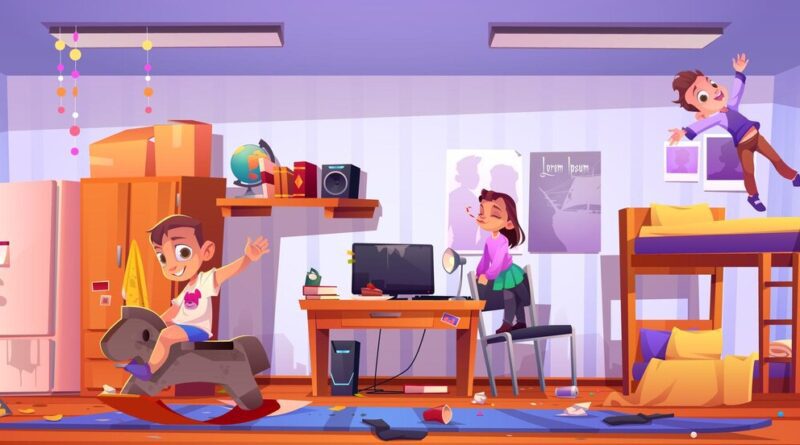When Clutter Takes Over Your Life
Clutter is more than just a disorganized desk or an overflowing closet. When clutter takes over your life, it can significantly impact your mental health, productivity, and overall well-being. The physical chaos around you often mirrors internal turmoil, making it difficult to think clearly and function effectively. If you’ve ever been overwhelmed by clutter, you’re not alone.With the right support and guidance, it is possible to reclaim your space and your peace of mind.
The Emotional Impact of Clutter
Clutter doesn’t just make your home look disorganised; it also weighs heavily on your mental health. Living in a cluttered environment can:
- Heightened stress and anxiety: The ongoing visual reminder of incomplete tasks can amplify stress levels.
- Lower productivity: Searching for misplaced items or working in a cluttered space can drain time and energy.
- Impact on relationships: Conflicts over clutter can create tension with family members or roommates.
- Contribute to procrastination: Clutter can create a sense of overwhelm, making it harder to focus on tasks.
Research indicates that people living in cluttered environments are more prone to experiencing symptoms of depression and anxiety. A clean, organized space fosters calmness and clarity, enabling better emotional and mental balance.
Why Clutter Happens
Understanding the causes of clutter accumulation is the first step toward addressing it. Common reasons include:
- Sentimental attachment: Difficulty letting go of items with emotional value.
- Procrastination: Putting off decisions about where items belong.
- Shopping habits: Impulse purchases that add to unnecessary possessions.
- Time constraints: Hectic schedules that leave minimal time for organizing.
- Underlying mental health issues: Conditions like hoarding disorder, anxiety, or ADHD may lead to excessive clutter.
The Role of Counselling in Managing Clutter
When clutter becomes too much to handle, professional counseling can offer effective tools and strategies to help regain control. Best Psychologists can help you:
- Identify the emotional triggers behind clutter accumulation.
- Develop practical organizational skills and routines.
- Address underlying mental health conditions like anxiety or hoarding tendencies.
- Improve time management and decision-making skills.
At Psychowellness center, a team of experienced top psychologists offers personalized support to help individuals manage clutter and its emotional impacts. With both in-person and online counselling options, you can access expert help from the comfort of your home.
Meet the Experts at Psychowellness center
ThePsychowellness is home to a dedicated team of mental health professionals, including:
- Dr. RK Suri: A highly esteemed clinical psychologist with years of experience in addressing complex mental health challenges, including stress and anxiety related to clutter.
- Mr. Utkarsh Yadav: Known for his empathetic approach, he specializes in helping individuals develop practical solutions for better organization and mental clarity.
- Ms. Sakshi Dhankhar: An expert in stress management, she provides tailored strategies to reduce the emotional toll of clutter.
- Ms. Tanu Sangwan: With a focus on cognitive-behavioral therapy (CBT), she helps clients understand and change behaviors contributing to clutter.
- Ms. Srishti: Her compassionate approach encourages clients to overcome procrastination and build healthier habits.
- Ms. Sangeeta: A specialist in relationship counselling, she assists couples and families in resolving conflicts around shared spaces and clutter.
- Mrs. Kala Sengupta: Her guidance is instrumental for older adults dealing with lifelong clutter habits.
- Ms. Riya Rathi: With expertise in online counselling, she makes professional help accessible to clients anywhere.
Online Counselling with TalktoAngel
In the digital age, seeking help has become more accessible than ever. Online counselling platforms like TalktoAngel, associated with ThePsychowellness, ensure that support is available anytime and anywhere. Whether you’re dealing with clutter-induced stress or deeper emotional issues, online sessions provide:
- Flexibility to schedule sessions around your convenience.
- Privacy and comfort of talking from your own space.
- Access to a wide network of qualified psychologists.
TalktoAngel also offers resources such as self-help tools, webinars, and articles to complement therapy sessions.
Steps to Declutter Your Life
While professional guidance is invaluable, here are some actionable steps you can take to manage clutter:
- Start small: Focus on one task at a time, like organizing a single drawer or shelf, to avoid becoming overwhelmed.
- Follow the “one year rule”: If an item hasn’t been used in the past year, consider donating or getting rid of it.
- Create zones: Designate specific areas for work, relaxation, and storage to maintain order.
- Create routines: Dedicate a few minutes each day to organize and clean up.
- Seek support: Share the decluttering process with family or friends for encouragement.
Moving Toward a Clutter-Free Life
Decluttering is more than just tidying up; it’s about creating a space that nurtures your mental and emotional well-being. With support from professionals like those at the Psychowellness center and platforms like TalktoAngel, you can overcome the challenges of clutter and create a more peaceful, organized life.
If clutter is overwhelming your life, don’t hesitate to ask for help. Remember, addressing the underlying causes and learning effective strategies can lead to lasting change. Take the first step today and reclaim your space and peace of mind.
References
- Frost, R. O., & Steketee, G. (2010). Stuff: Compulsive Hoarding and the Meaning of Things. Houghton Mifflin Harcourt.
- Saxbe, D. E., & Repetti, R. L. (2010). No place like home: Home tours correlate with daily patterns of mood and cortisol. Personality and Social Psychology Bulletin, 36(1), 71-81.
TalktoAngel. (2024). Retrieved from https://www.talktoangel.com




